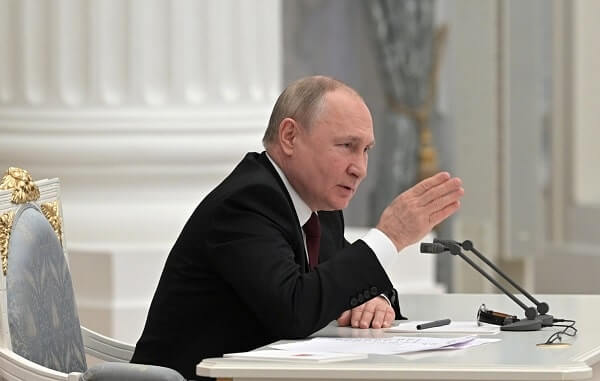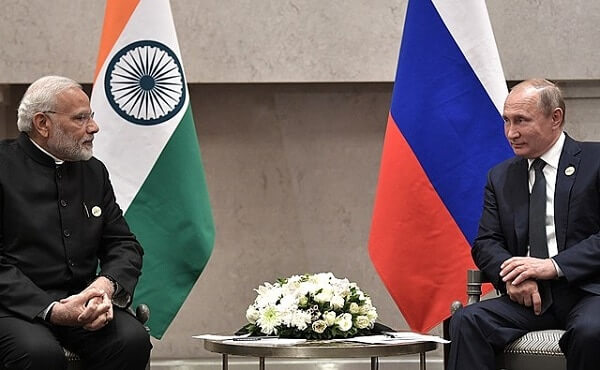When Vladimir Putin became the first Russian leader to visit Australia – for the 2007 APEC summit in Sydney – I had a chance to ask him what he thought of Australia.
“I never think of Australia,” he replied.
Putin has probably not thought of Australia much since, apart from the fuss we made over Russian-backed rebels in Ukraine shooting down Malaysian Airlines MH17 in 2014, and his visit to Brisbane in 2014 for a G20 leaders summit.
Russia and Australia have limited economic ties. But Russia’s invasion of Ukraine will ripple through the global economy, reaching as far as Australia. Russia’s actions are already affecting things like petrol prices.
More significantly Putin’s belligerence could further destabilise our already fraught relationship with China, our most important trading partner.
So Australia certainly has reason to think about Putin’s actions now.
Russia’s crucial role in the global economy
Measured by gross domestic product, Russia is the world’s 11th biggest economy, just behind South Korea and in front of Brazil. Its 2020 GDP of US$1,646 billion wasn’t much bigger than Australia’s (in 13th spot, with US$1,610 billion).
But Russia matters to the global economy because, like Australia, it is a major global supplier of natural resources such as oil, gas, coal, metals and wheat.
Disruption of these supplies could happen through Western sanctions on Russia, or through Russia cutting off supplies – or both.
The intention in either scenario is to punish the other side. The effect on the global economy, already threatened by inflation and COVID-related supply side shocks, will be the same.
Expect international price rises
Russia is also a major global supplier of metals such as aluminium and palladium, a rare and expensive metal used in catalytic converters to reduce toxic exhaust emissions from cars and other vehicles.
Palladium has other important uses too, including in hydrogen fuel technology. Russia accounts for about 40% of global supply.
Sanctions banning Russian imports will naturally reduce global supply and increase the prices of these resources, as well as the products made from them.
How much of an inflationary effect this causes will depend on how much other suppliers increase their output, or whether Russia can increase sales to other buyers not participating in sanctions. China, for example, has ended all restrictions on wheat imports from Russia.
Putin has built strong ties with Saudi Arabia, Iran and other oil-producing and non-democratic states as a bulwark against the West. So replacing Russian supplies and enforcing sanctions effectively won’t be easy.
Europe’s vulnerability
The European Union is particularly vulnerable to supply shocks, due to its heavy reliance on energy imports, with 41% of the natural gas and 27% of the crude oil it consumes coming from Russia.
For Germany, Europe’s economic powerhouse, about 34% of oil imports and 35% of its gas imports come from Russia. This makes the German government’s decision to halt the Nord Stream 2 gas pipeline being laid in the Baltic Sea between Russia and Germany a gutsy call.
Given the central role of German manufacturing to European supply chains, disruptions to its energy supply will have major global economic implications.
The biggest risks for Australia
In the very short term, there may be some upsides for Australian exporters, such as wheat farmers.
Russia is the world’s biggest wheat exporter and Ukraine, long known as Europe’s bread basket, is the fifth (Australia is sixth).
The likely disruption to these supplies can be expected to increase the world wheat price, as happened in 2014 when Russia annexed Crimea.
Australia is also a major natural gas exporter. However, because it exports that gas by ship (as liquefied natural gas) rather than through pipelines, there are constraints on it increasing exports in the near term.
So some Australian exporters who compete with Russian suppliers should benefit from higher prices in the short run. But these benefits will soon be overrun by the adverse impact of global economic disruption.
The biggest risk to Australia, though, is if China decides to follow Russia’s lead.
We saw at the Beijing Winter Olympics the warming of what has historically been a frosty Sino-Russian relationship. Putin and Xi Jinping have much in common.
If Xi sees the West being divided and weak over Ukraine, as it was over Afghanistan, then he may make matters tougher for Taiwan. This would jeopardise Australia’s trade with China.
READ ALSO: Indian links to a post-pandemic recovery

What else can be done?
All the signs are that Putin is prepared to ride out sanctions, gambling that he has enough reserves to tough them out or enough friends to undermine their effectiveness.
What else can be done?
One option is a strong economic strengthening of Ukraine through trade and infrastructure measures. This could include the European Union granting Ukraine preferential trade and investment deals, and the Western allies assuring it favourable supply of natural resources.
Russia may like to intimidate, but it doesn’t have the economic strength of a united opposition, including the US, European and Asia-Pacific nations.
There may not be an immediate military solution, nor a neat diplomatic fix. But the economic dimensions to the crisis may be more in favour of Ukraine than first meets the eye.
Industry Professor and Chief Economist, University of Technology Sydney
This article first appeared in The Conversation. You can read it here.




